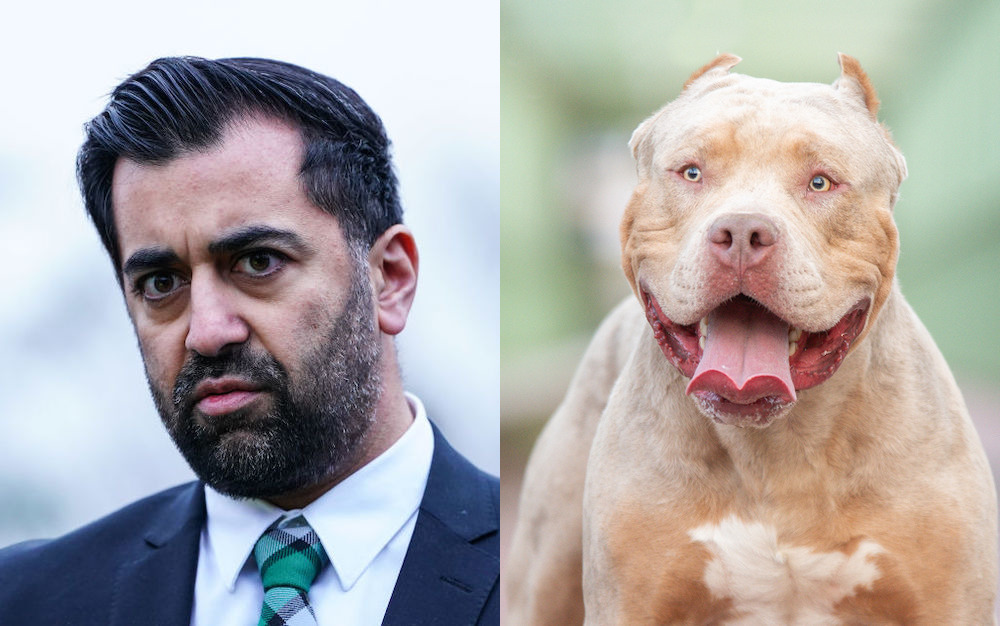Humza Yousaf has just executed an embarrassing U-turn and effectively banned XL Bully dogs in line with England and Wales. This has inevitably unleashed a pack of bad canine puns about the SNP making a dog’s breakfast of devolution. We always thought Humza Yousaf was barking, now we know. Boom boom.
This episode is another botched exercise in cross-border grievance mongering
Laughter aside, this episode is another botched exercise in cross-border grievance mongering, something at which the SNP used to be so adept. When the UK government announced last September that there was to be a ban selling or breeding these aggressive animals, following a spate of attacks on people, Mr Yousaf said: not so fast. Scotland wasn’t about jump to the UK government’s tune in outlawing maligned canines.
The Community Safety Minister, Siobhian Brown, wrote to the UK government in November ‘advising’ that a ban would not be introduced in Scotland by the deadline of 31 December. ‘We don’t think [a ban] is needed’ said Mr Yousaf earlier this month, ‘given the strict regime we have in place.’ Scotland you see is a tolerant land and upholds the principle of ‘deed not breed’. Canine inclusion if you will. The Scottish Society for the Prevention of Cruelty to Animals (SPCA) doesn’t agree with indiscriminate banning of breeds either.
There is actually some confusion about exactly what an American XL Bully is since, technically, it isn’t a recognised breed, just a very aggressive blunt-faced beast with 20 inch shoulders and ferocious jaws. If you see one you know one.
By Christmas, XL Bullies were crossing the Scottish borders in large numbers to escape the imposition of the UK ban. One breeder reportedly transported 30 of them in one go. Glasgow woman Kerryanne Shaw, who runs the ‘All Bullie Charity Rescue’, announced plans to set up an XL Bully sanctuary in Dundee. A mass transit of canine refugees had begun.
But the Scottish government wasn’t prepared to award asylum to the dogs. Brown pleaded with owners to stop this ‘rehoming’ as she put it, to no avail. Yesterday, Yousaf conceded defeat and accepted that Scotland would ‘in essence replicate’ the legislation for England and Wales in the interests of public safety. Farewell bully dogs.
It was all Westminster’s fault of course. The Scottish government insist that they were caught unawares by the UK move, even though it was announced four months ago. They needed time to think – though it’s not clear how long you need to think before you ban a breed responsible for numerous attacks on humans, including mauling to death of Dundee kennel owner, Adam Watts, in October
Yousaf’s attempt to tum this into a constitutional grievance provoked howls of derision. The independence-supporting Herald columnist, Neil Mackay said ‘If the SNP cannot navigate a ban on dangerous dogs, it’s unfit for office. It’s that simple.’
To be fair, the Scottish government probably thought it was trying to navigate away from a repetition of the infamous Dangerous Dogs Act. This was passed by Westminster in haste in 1991 and led to confusion because no one knew what a dangerous dog actually is. Almost any dog, if trained badly enough, can be dangerous. The Scottish SPCA is furious at the Scottish government’s capitulation to breed phobia.
In the midst of scandals like the Post Office and hospital waiting lists this dog’s breakfast is a relatively minor matter. But it does rather elegantly underline the problem of being a small country having a porous border with a large neighbour. The Scottish government may have the power to legislate for doggy diversity but it has no way of preventing this being exploited by bad actors. This is what freedom of movement means, a hallowed principle in the SNP’s lexicon.
Nationalists insist that all issues would solved by independence, but that is no panacea. Halting illegal dogs crossing into Scotland would require setting up the full apparatus of a hard border: quarantine, border posts, passport checks and guards checking cars for smuggled goods. The SNP has always insisted that is precisely the border they do not want after independence. But geography is destiny – and sometimes you have to accept it.







Comments